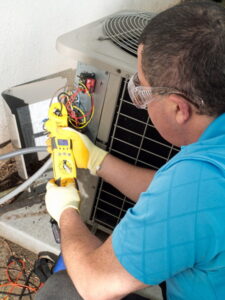
The overcharge we’re talking about here has nothing to do with the initial price of an air conditioner. An AC system is overcharged if it has too much refrigerant in it. The amount of refrigerant in an air conditioner is known as the system’s charge, and each AC model is designed to use a precise charge. Either too little (undercharged) or too much (overcharged) is bad news for the AC. It leads to malfunctions, poor performance, and an eventual system breakdown.
As you get into your summer preparation in West Chester, PA, we want to address the danger of the overcharged AC. Unfortunately, unscrupulous people posing as HVAC experts often advise homeowners they need to “refill” or “top off”their AC’s refrigerant before summer. This is 100% false! We’ll go into the overcharged AC problem more below.
How an overcharged AC can happen
There are several sources that can lead to an AC having too much refrigerant:
- The AC received a poor installation and the wrong amount of refrigerant was put in from the start.
- A DIY attempt to repair refrigerant leaks put excess refrigerant into the system, believing (falsely) it’s better to err on the side of too much rather than too little.
- An amateur repair for leaking refrigerant created the same problem.
- Shady “technicians” pushing for adding refrigerant when it’s unnecessary.
The problems with an overcharged AC
The major trouble that too much refrigerant causes for an air conditioner is that it changes the pressure throughout the system, leading to a decline in performance. The excess refrigerant also creates a huge threat to the compressor: if cold liquid refrigerant moves backwards into the compressor (called slugging), it will often cause the compressor to burn out.
Watch for these problems that will warn you have an overcharged air conditioning system:
- A decline in cooling power: You might think the opposite would happen—extra refrigerant would mean too much cooling. But an overcharged refrigerant creates a condition called subcooling because the refrigerant is starting to gather inside the compressor and lowering the temperature inside it. You’ll notice your home receives less cooling power when this occurs—and it means the compressor is already in danger.
- Ice on the evaporator coil: When there’s too much refrigerant moving through the evaporator coil, the cold liquid won’t be able to warm up enough as it absorbs heat. Because the refrigerant stays too cold, it will freeze water moisture on the coil surface and further restrict cooling power.
- Compressor noise: The warning sound you’ll hear from the compressor when the AC is overcharged is squealing. This is another sign of liquid refrigerant entering the compressor. The spray of refrigerant into the compressor should be as a gas. If it’s a liquid, it will create this squealing noise.
Please don’t attempt to bleed out excess refrigerant on your own. If you suspect an overcharged AC, call our technicians and we’ll see the system is restored to its factory-set charge.
Michall Daimion Heating & Air Conditioning, Inc. has been the Main Line’s Premier Service Provider since 1976. Call us for all your AC repair needs.
